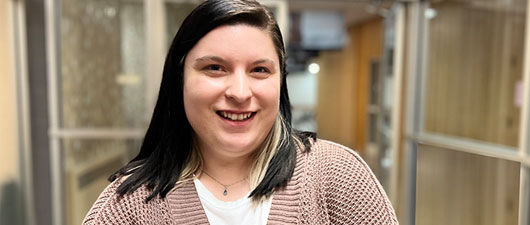Bachelor of Arts in Biological Sciences
 Pictured | Mackenzie Moosbrugger | Bachelor of Arts in Biological Sciences / Minor in Foundations of Education | Union, Michigan (hometown)
Pictured | Mackenzie Moosbrugger | Bachelor of Arts in Biological Sciences / Minor in Foundations of Education | Union, Michigan (hometown)
Bachelor of Arts in Biological Sciences
Bachelor of Arts (BA) students receive a rigorous grounding in biology that provides a starting point for careers in private industry, with non-profit or government organizations, teaching at the secondary level, or some health professions (e.g., physician assistant or physical therapy). Students have the opportunity to couple their biology education with a minor (e.g., business, environmental studies, sustainability studies, or psychology) that supports their career aspirations. To help foster student success, faculty provide high-quality academic and career advising throughout the student’s time at IU South Bend.
The curriculum includes up-to-date content in a wide variety of elective courses as well as education in the process of scientific discovery, with emphasis on reading scientific literature, writing about and presenting scientific information, designing scientific studies, and collecting, manipulating, and analyzing scientific data. Many students also work closely with faculty on independent research projects that teach valuable laboratory and field skills and increase success in applications for post-graduate employment or admission to professional programs. Compared to the BS degree, the BA places less emphasis on the cognate disciplines of chemistry, physics, and mathematics, and because of this, students seeking to enter MS or PhD programs or medical, pharmacy, dental, or veterinary school or other healthcare-related professional programs are advised to earn the BS rather than the BA.
Academic Advising
Your academic advisor is a critical partner in fostering your success at IU South Bend and beyond. Your advisor will help you explore academic majors and careers, plan your degree, choose classes, learn about internships and study abroad, and much more. To see who is assigned as your advisor, visit your Student Online Advising Record in one.iu.edu. For more information about advising at IU South Bend, visit the website for the Undergraduate Advising Center.
Final responsibility for meeting degree requirements rests with the student.
Questions about advising? Email sbadvise@iu.edu or call (574) 520-4550.
Degree Requirements (120 cr.)
Degree Map >>
Students receiving the Bachelor of Arts degree must complete 120 total credit hours including:
- MATH courses for the B.A. in Biology fulfill the Fundamental Literacies: Quantitative Reasoning requirement
- BIOL-L 403 Biology Seminar fulfills the Extended Literacies: Visual Literacy requirement and is required for all Biological Sciences majors
- The laboratory science requirement is fulfilled by required biology courses.
- Required Minor taken in any campus school or interdisciplinary program (15-18 cr.)
- Major Requirements (34-36 cr.)
- Elective Requirements (18 cr.)
- Free Electives (balance of credits needed to equal 120 cr. requirement)
- A minimum of 30 credit hours at the 300– or 400–level
- Biology courses and all courses required for the minor must be completed with a grade of C– or higher.
- All courses are 3 credit hours unless otherwise noted.
Major Requirements (34 cr.)
Biological Science (19 cr.)
- BIOL-L 101 Introduction to Biological Sciences 1 (5 cr.)
- BIOL-L 102 Introduction to Biological Sciences 2 (5 cr.)
- BIOL-L 211 Molecular Biology
- BIOL-L 311 Genetics
- BIOL-L 403 Biology Seminar
Fulfills Extended Literacies: Visual Literacies
Chemistry (13 cr.)
- CHEM-C 105 Principles of Chemistry I
- CHEM-C 106 Principles of Chemistry II
- CHEM-C 125 Experimental Chemistry I (2 cr.)
- CHEM-C 126 Experimental Chemistry II (2 cr.)
- CHEM-C 341 Organic Chemistry Lecture 1
Physics (5 cr.)
Select one from the following:
- PHYS-P 201 General Physics 1 (5 cr.)
- PHYS-P 221 Physics 1 (5 cr.)
Mathematics (3-5 cr.)
Select one from the following:
- MATH-M 119 Brief Survey of Calculus 1
Fulfills Fundamental Literacies: Quantitative Reasoning - MATH-M 215 Calculus I (5 cr.)
Fulfills Fundamental Literacies: Quantitative Reasoning
Elective Requirements (18 cr.)
Students must complete at least 18 additional credit hours of elective Biological Sciences courses. This coursework must include at least two laboratory classes, at least one course from the Organismal courses area, and at least one course from the Cellular courses area.
Organismal Courses
- BIOL-B 300 Vascular Plants
- BIOL-L 304 Marine Biology
- BIOL-L 308 Organismal Physiology (5 cr.)
- BIOL-L 318 Evolution
- BIOL-L 335 Introduction to Nanomedicine
- BIOL-L 338 Introduction to Genomics
- BIOL-L 342 Tropical Marine Biology Field Course
- BIOL-L 473 Ecology
- BIOL-L 474 Field and Laboratory Ecology (2 cr.)
- BIOL-Z 373 Entomology
- BIOL-Z 383 Laboratory in Entomology (2 cr.)
- BIOL-Z 460 Animal Behavior
- PHSL-P 262 Human Anatomy and Physiology 2 (4 cr.)
Cellular Courses
- BIOL-L 280 Introduction to Bioinformatics
- BIOL-L 312 Cell Biology
- BIOL-L 313 Cell Biology Laboratory
- BIOL-L 317 Developmental Biology
- BIOL-L 321 Principles of Immunology
- BIOL-L 323 Molecular Biology Laboratory
- BIOL-L 334 Biology of Cancer
- BIOL-M 430 Virology Lecture
- MICR-M 310 Microbiology
- MICR-M 315 Microbiology Laboratory (2 cr.)
Other Elective Options
- BIOL-L 391 Special Topics in Biology (2-3 cr.)
May be used in either course area depending on the topic; and may be used as a laboratory course if the course includes a laboratory component - BIOL-L 490 Individual Study (1-6 cr.)
May be used as one laboratory class as long as the student completes at least two credit hours of laboratory or field-based research on the same project - BIOL-L 497 Internship in Biology (1-3 cr.)